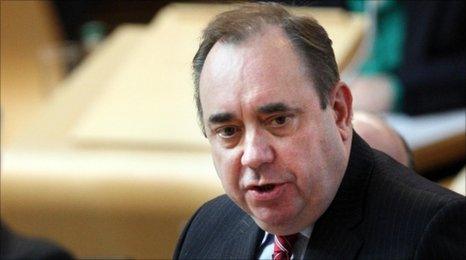SNP squares up to electoral fight
- Published

On the afternoon of 4 May 2007, in the sprawling grounds of an upmarket hotel, the assembled crowd turned their heads up towards a small speck in the sky.
The speck slowly became a helicopter and, as it landed on a perfectly manicured lawn, a man jumped out, striding confidently to a lectern to deliver a speech in the warm spring sunshine.
But this was no US presidential address, it was SNP leader Alex Salmond, who, within days of his happy landing at Edinburgh's Prestonfield House, would be elected by parliament as first minister of Scotland.
That election is one which will go down in history. The Nationalists had won for the first time, as voters delivered the message that, after years of Labour governments, they wanted a change.
At the head of it all was the presidential Mr Salmond, who only a few years previously had made a dramatic return as SNP leader, rescuing the party from arguably one of its darkest periods.
But things have changed since then. Back in 2007, money was still plentiful.
For a decade, the Treasury grant funding the Scottish government had been on the up. Then the global economy went into meltdown and, as the UK's massive spending deficit began to be cut at Westminster, the Holyrood budget was squeezed.
With the next Scottish Parliament election now just weeks away, and with the economy really the only game in town, the SNP finds itself in a crucial position.
As a minority government, the Nationalists say they have restored free education, ended prescription charges, frozen council tax, put an extra 1,000 bobbies on the beat and brought forward the world's most ambitious climate change legislation.
All this, the SNP argues, has been achieved against the backdrop of UK spending cuts created by Labour and rammed home by the Tory/Lib Dem coalition.
But not everyone sees it quite like that.
The SNP government has taken a fair amount of flak from rival politicians for continuing to push manifesto commitments which were clearly failing to win enough support in the Holyrood chamber.
The Scottish independence referendum, proposals to scrap council tax and minimum alcohol pricing have been three such casualties.
Elsewhere, the SNP pledged to deliver class sizes of 18 or fewer for all pupils in the first three years of primary, but, when MSPs were eventually asked to approve a legal limit of 25 pupils for P1 classes as a "stepping stone", the commitment was branded a failure by the opposition.
Plans to end short jail terms of six months or less was watered down to a presumption against three months, so ministers could gain enough opposition support for the plans.
And then there were the pledges which never even made it off the pages of the SNP manifesto - writing off student debt and grants for first-time home buyers, for example.
During all this time, the battle for economic hearts and minds has been raging at Holyrood - with the SNP insisting its budgets, despite being cut, have made recovery the top priority, while opposition parties say they have failed to focus on creating jobs.
Marginal areas
And anyone wanting a reminder there's an election on the way need only take a look at the list of government announcements in the past week or so - approval for a 拢290m Glasgow subway upgrade, a deal to save the Skykon wind turbine in Campbeltown and a reappraisal over the potential burial of the controversial Beauly-Denny power line at Stirling.
Probably just coincidence, then, that the SNP are fighting in marginal areas such as Glasgow, Argyll and Bute, and Stirling.
Of course, other parties have form here too - most notably in 2007 when the then Labour Health Minister Andy Kerr announced Scotland's 67,000 nurses and thousands of other health professionals were getting a 2.5% pay rise - kicking in a month before voters went to the polls.
Aside from policy, there has also been the philosophical debate, about Scotland's potential as a nation.
Mr Salmond has been known to turn to the thoughts of SNP founder Robert Cunningham Graeme, who once said: "The problem for Scotland is not the English, who are a great and noble people. The problem for Scotland is those Scots who are born without imagination."
Westminster 'straightjacket'
The SNP leader half agrees with this - he argues that, rather than being born without imagination, it's been drummed out of them by "political parties, who have a vested interest in lowering the expectations of the people".
That argument's strongly countered of course, by the likes of Scottish Labour leader Iain Gray, who says that no one movement has a monopoly on the Saltire.
Still, the SNP says that, in the election ahead, Scotland faces a simple choice - to stay in the Westminster straightjacket which keeps Holyrood as a "pocket money parliament" or take control of its own destiny.
Three years on from that dramatic 2007 US-style helicopter landing, Mr Salmond declared the "first age of devolution" to be over, that the parliaments' powers had run their course.
The party is now playing its trump card, by urging voters to "re-elect Alex Salmond as first minister", even though they don't technically do that. A presidential election indeed.
As the Scotland Bill is poised to deliver increased tax and spending powers to Holyrood, it will be up to the voters to decide whether they want to back a party committed to the strength of the Union, or one which wants Scotland to strike out on its own.